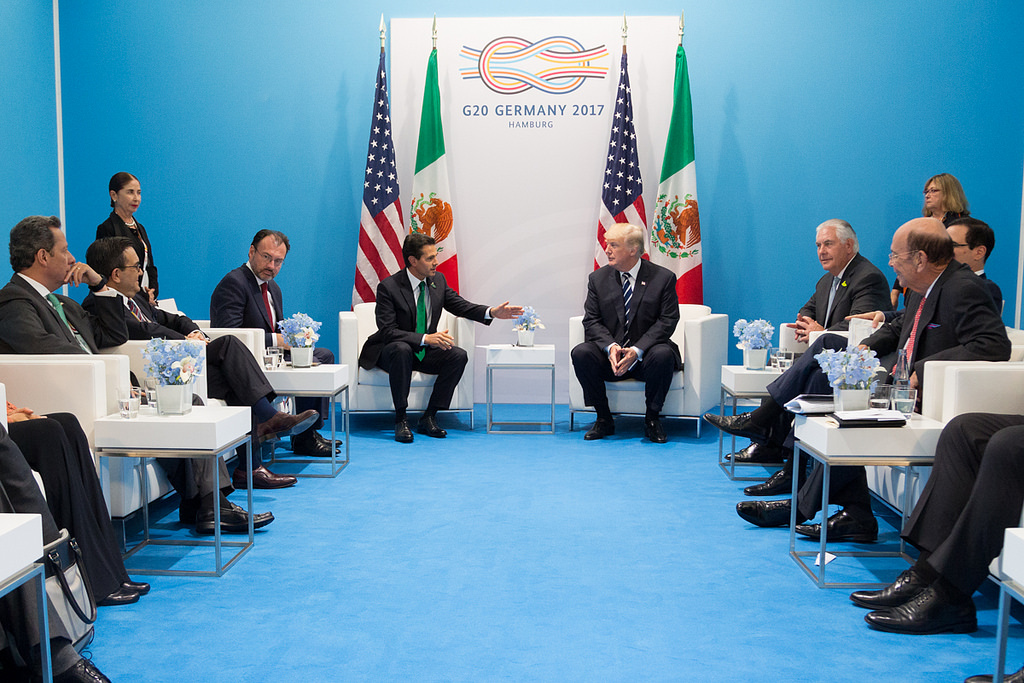By Cullen Hendrix for Denver Dialogues.
Next month, representatives of the United States, Canada, and Mexico will sit down to begin the formal renegotiation of the North American Free Trade Agreement (NAFTA). Renegotiating or “ripping up” NAFTA was – along with withdrawing from the Trans-Pacific Partnership (TPP) – a major component of candidate Trump’s economic plan. President Trump followed through on TPP, withdrawing the US from the agreement on his third day in office. Where the NAFTA renegotiation will lead is anyone’s guess.
The economics of NAFTA are complicated, but the headline result has been to boost productivity in all three partner countries and create a dynamic, interlinked common market. As with any move toward free trade, less competitive enterprises in each country have felt increased competition and pressure. In the main, however, NAFTA has produced broad benefits for all three countries while concentrating the pain – and thus handwringing and political wrangling – in a few specific sectors, like US auto workers and Mexican corn producers. That pain is real, but addressing said pain through compensatory economic policies is more sensible than tossing out the baby with the bathwater.
Walking away from NAFTA would be a terrible idea on purely economic grounds. But its security implications for US-Mexico relations might be even more worrisome. Broadly, NAFTA has contributed to stabilizing the US-Mexico relationship, historically one of the more fraught in the Americas. NAFTA has increased US-Mexico cooperation along the border and reduced incentives for undocumented immigration. Undoing NAFTA thus hazards less cooperation in cross-border law enforcement, may spur undocumented immigration, and may renew diplomatic tensions between the two countries.
First, the big picture. US-Mexico relations have often been troubled due to the former’s territorial ambitions and the latter’s economic dependence on its larger northern neighbor. As former Mexican president Porfirio Diaz noted, “Pobre México, tan lejos de Dios y tan cerca de los Estados Unidos” (“Poor Mexico, so far from God and so close to the United States”). Mexico lost half its territory to its northern neighbor in the 19th century. The United States invaded Mexico by land and sea in the early 20th century. Mexico forcibly nationalized US and British oil companies to create and consolidate PEMEX. The United States was widely reviled not just in Mexico but Latin America more broadly for pushing highly conditional structural adjustment programs in the 1980s.
NAFTA has helped change much of this. Before the election of President Trump, two out of three Mexicans had a favorable opinion of the United States, a trend that extends back to the early 2000s. NAFTA was part of a broader suite of economic and political reforms that helped facilitate democratization, with Mexico’s governing PRI party ultimately losing the presidency for the first time in 2000. Though relations between the two are still strained by several issues, in the macro sense, bilateral relations between the United States and Mexico have been stronger post-NAFTA than perhaps at any previous point in history.
More specifically, NAFTA has promoted US national security in two concrete ways. The first is around cross-border cooperation in law enforcement. Even before border security concerns ramped up in the 2000s due to concerns about terrorism and drug-related violence, increasing cross-border trade catalyzed enhanced cooperation between US and Mexican border security forces. In the late 2000s, this cooperation deepened in response to the Mexican drug war, a war fueled by US consumers and money, US guns, and complex cross-border criminal organizations. This war has claimed as many as 175,000 lives in the past decade.
Since 2008, this cooperation has come under the umbrella of the Merida Initiative. The components of US-Mexico security cooperation are extensive, ranging from seizure and forfeiture of cross-border criminal networks’ assets to US support for justice sector reforms and technology transfers – both hard and soft alike. The Merida Initiative has not been without its critics, but it is difficult to imagine that disengaging around these issues will improve the situation in Mexico. Americans would still demand illegal narcotics and Mexico would still have all the cartel-related problems it faces now – just with vastly diminished resources and worsened economic prospects.
Second, NAFTA has likely helped curb undocumented migration to the United States, a significant source of humanitarian concern – undocumented migrants face arduous conditions during and after their journey – and a flashpoint for nativist sentiment in the United States, especially around elections. Many observers feared a surge in Mexican immigration to the United States, as the opening of Mexico’s agricultural markets to foreign competition would drive down rural incomes and become a significant “push” factor.
Some of this undoubtedly occurred – the Mexican immigrant population in the United States skyrocketed in the late 1980s through mid-2000s. But Mexico was already experiencing massive rural-urban migration and a decline of agricultural livelihoods. NAFTA may have accelerated these processes, but it did not create them, and undoing NAFTA would not stop them. Additionally, NAFTA has also spurred agricultural development in Northern Mexico and helped raise incomes across the country to the point that net Mexican immigration to the United States has moved to zero, and fewer and fewer Mexicans perceive life north of the border as better. Walking away from NAFTA would likely cause a severe contraction in the Mexican economy – which is one 1/17th the size of the US and much more dependent on intra-NAFTA trade than the United States for jobs and growth – that would reverse this tide.
Mexico is still a significant conduit for undocumented migration, serving as a transit route for migrants from Central America. US and Mexican officials have coordinated to curb Central American migration, at significant cost to Mexico. If the NAFTA renegotiation re-opens old wounds and creates new ones, the United States can expect this form of cooperation to diminish as well.
NAFTA is far from perfect. On balance, however, it has paid economic dividends and improved security cooperation along the US-Mexico border. NAFTA’s collapse would come with significant costs – bilateral security cooperation would be one of them.




